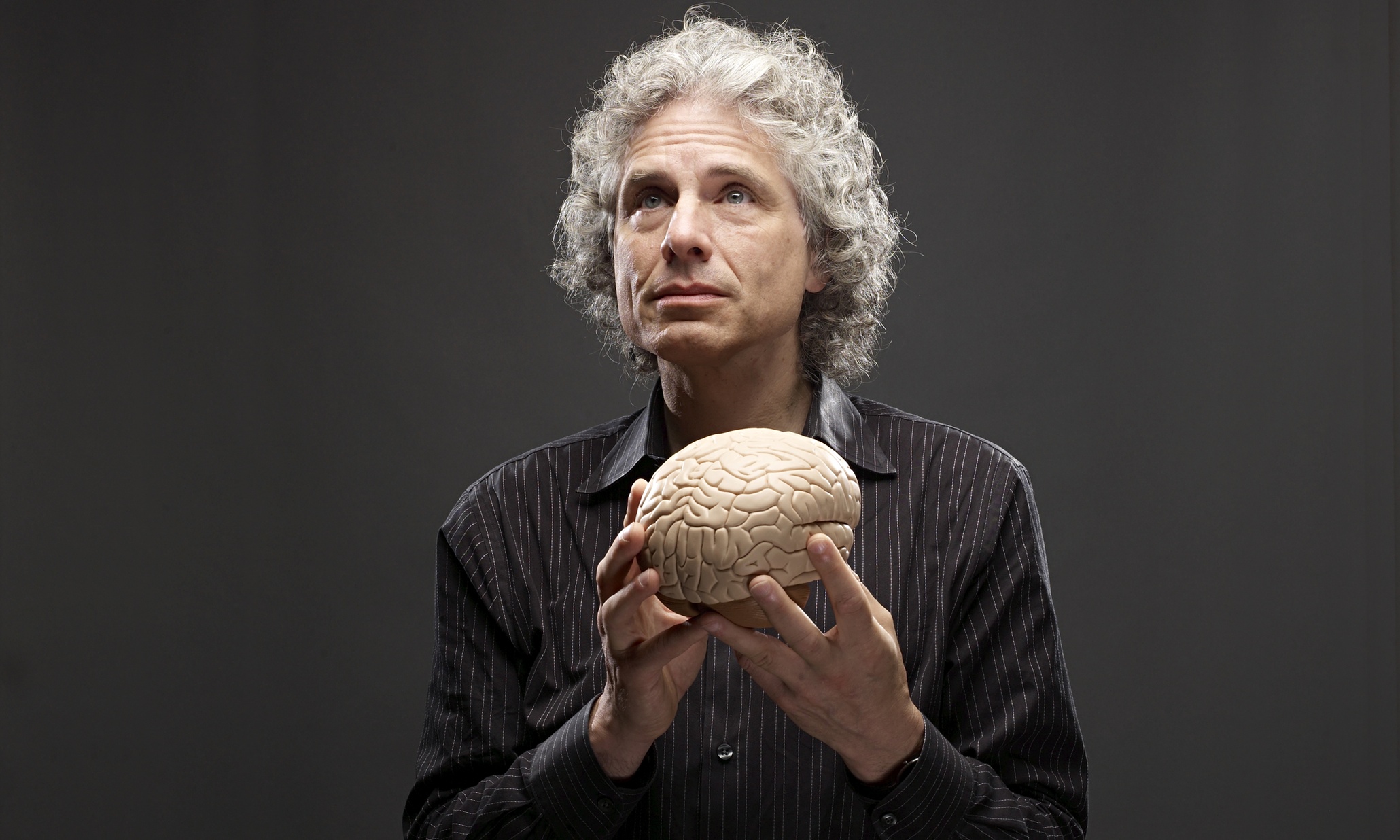An Interview with Steven Pinker
Scientist/Author Talks Latest Book, ‘Enlightenment Now’

It’s difficult not to feel that these are dark days, what with the government rollback of environmental-protection legislation, immigrant children in what amount to internment camps, and women’s rights on the chopping block, to name a few examples. It’s enough to make you want to crawl in bed and pull the covers over your head. For Steven Pinker, a cognitive psychologist, linguist, author, and Harvard professor, the frightening state of country — and world — affairs is exactly why it is important for people to embrace the principles that were purported during the 18th century’s Enlightenment, which, using reason (i.e., scientific thinking/data) as its center point, spawned ideals such as liberty, tolerance, and constitutional government.
In his latest book, Enlightenment Now: The Case for Reason, Science, Humanism, and Progress, Pinker uses meticulous research and data to lay out the ways in which humans have progressed and why we will continue to do so. The book has received both praise and criticism — some reviewers finding it “heartening and important” (Publishers Weekly), while others feel Pinker shows a “casual dismissal of ethics” (Booklist) regarding some infamous studies, such as the Tuskegee syphilis experiment. Whether you decide to agree or disagree with Pinker’s conclusions, Enlightenment Now offers up thought-provoking arguments surrounding humankind’s progress that make it a compelling and worthy read.
I recently spoke over the phone with Pinker, who shared how the book came about. The following is a truncated version of our conversation.
What got you thinking about bringing back the Enlightenment? It was basically two sets of developments. One of them is a continuation of the epiphanies that led me to write The Better Angels of Our Nature, namely coming across data sets showing improvements in the human condition that paint a different picture of humanity than one that you get from the news, as the news concentrates on things that go wrong and not things that go right and events rather than trends. Violence, for example, as long as rates of violence haven’t gone down to zero, there will always be enough of them to fill the news. And watching the news, you could never learn that rates have come down because they don’t come down to zero. And likewise with war and with rape and with child abuse.
And then I came across data showing that there were improvements in other realms of human well-being as well, not just violence. We’re living longer, and we’re becoming healthier and better educated, more literate, and we have more leisure time, so we can afford more small luxuries like plane travel, more food. So instead of malnutrition being a problem, obesity is a problem.
In area after area, the data show a different story of how humanity is changing than the headlines. So it was the discovery of these data sets which made me realize there’s a whole other way of understanding the world that is often absent from the news media and that that story needed to be told. That raised the question of why things have improved. … The universe doesn’t contain an escalator that makes people better and better off. Quite the contrary. The laws of nature, left to their own devices, will make us worse off as things fall apart.
How can we account for progress on these multiple fronts? I realized that the set of ideas that were concentrated around the time of the Enlightenment were a major source of innovations that drove this progress. In particular, the idea of using reason, as opposed to tradition and dogma and superstition, the idea of science as a means to improve human welfare. And humanism, the idea that it’s a universal human well-being that is the ultimate moral good, rather than the glory of a nation or the glory of the tribe or following the commandments of a deity.
Watching the news, you would think the exact opposite is happening. That’s right. But when you think about it, if there’s a country at peace, it’s not on the news. If there’s a school that isn’t shot up, it’s not on the news, and on and on.
With Trump in office it feels as if the sky is falling, so to speak.
Trump actually threatens a lot of this progress because a lot of it was driven by exactly the forces that he is trying to dismantle, such as international cooperation and agreements, such as regulations on the environment, such as social spending by governments. But the feeling that things are getting worse predated Trump, although Trump made them worse, and Trump may have even made some of them legitimate because it’s certainly not true that everything always gets better for everyone all the time. I mean, that would be magic, not progress. And indeed, the rise of populism, I argue, has been a setback for some kinds of progress.
In your chapter on existential threats you call out pessimism. What is the motivation for being in that state of mind? There have been systematic intellectual movements that are deeply pessimistic, and a lot of them have taken over especially at universities and the arts. Romanticism often laments a fall from a golden age or Garden of Eden, that we were all happy when we lived in simpler times, and technology [and] the Industrial Revolution has ruined life. A lot of the mainstays of the undergraduate curriculum — Nietzsche and Schopenhauer and Sartre and postmodernists like Foucault and Derrida … and Camus — they all believe that the Western civilization is circling the drain, and that’s what students are taught.
Why are we taught that? Well, I think it’s partly because the people who do the teaching, the intellectuals, often see themselves as apart from the institutions that make society run, apart from industry and government and the legal system and technology and all these things happening kind of without them. It wasn’t always true, because the Enlightenment field itself were intellectuals and thinkers, but since then a lot of the cultural critics and literary scholars and humanities professors see all these social changes and technological changes happening without them. Like, no one asked them about whether the Internet was a good thing or not, but it just happened.
And they see themselves as critics of institutions that it’s somehow being complicit with power to say that anything is going well. It seems to endorse the neoliberal establishment, and so social critics see themselves as being in opposition to that, particularly on the left, but there’s also a right-wing faction that thinks everything has gone wrong since the ’60s.
How do you get that message to the masses? I’m not in the messaging business or political consulting, but I try to influence the people who will hire the messengers …. I’m trying to convince educated, literate people, and skilled communicators, including politicians, [who] can project a message of guarded optimism and succeed. Barack Obama, who was a popular two-term president, had the message of hope and change, and I even stole one of his quotes as the epigraph for one of my chapters, namely, “If you had to pick a time to be born and you didn’t know who you would be, you’d pick now.”
Likewise, Ronald Reagan, on the right, was highly successful with a message of optimism. So it can be done with the right rhetoric. Not being a rhetorician myself, that isn’t my main goal, but I have consulted with Obama’s speechwriters, and I have met with heads of state like Justin Trudeau. And I just got back from Argentina, where I met with Mauricio Macri. I’ve met with Juan Manuel Santos of Colombia. So I give moral support to the politicians who themselves have to worry about the messages that attract large numbers of people.
Some people seem to thrive on pessimism. Many people are committed to the idea that society is in decline. It’s their politics. It’s behind their identity, criticizing institutions and undermining them. And to say, “Well, liberal democracy has got its problems, but we could do a whole lot worse,” and advancing science and technology does get people upset and angry.
I also argue that human progress has very little to do with religion, that it’s humanism—that is, the valuing of individual lives and health and happiness and education—that we should care about and not commandments from scripture. So that is a different way of … For many people, that comes as a shock. “What? We don’t get our morality from the Bible?” And I say to you, “That’s right. We don’t get our morality from the Bible, which tells us to execute homosexuals and adulteresses and disobedient children and blasphemers and gives a pass to rape and slavery. So yeah, we don’t get our morality from the Bible. That’s a good thing.”
Do you think more people today follow religion as opposed to humanism? There are two trends that are going in opposite directions. One of them is that people, in general, are becoming less religious, but religious people have more babies. So the number of religious people worldwide will probably go up, but the number of people who find religion will be outnumbered by the number of people who lose religion …. The other thing is that religious people organize and vote, and so they’ve got an electoral clout that’s out of proportion to their actual numbers. Secular people stay home, and they don’t vote. They’re not organized. They just … they kind of resist institutions, in general, whereas religious people reliably vote.
411: Arts & Lectures presents an evening with Steven Pinker Thursday, October 18, 7:30 p.m., at UCSB’s Campbell Hall. Call (805) 893-3535 or see artsandlectures.ucsb.edu.



